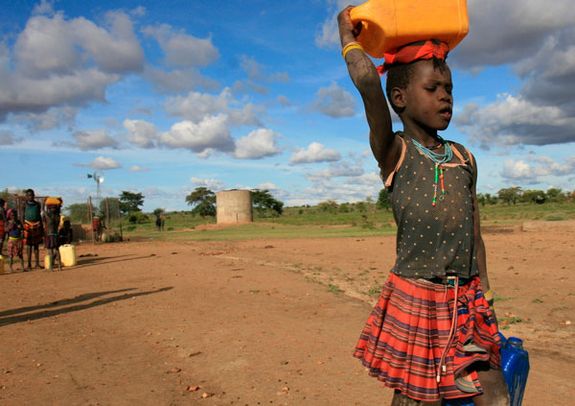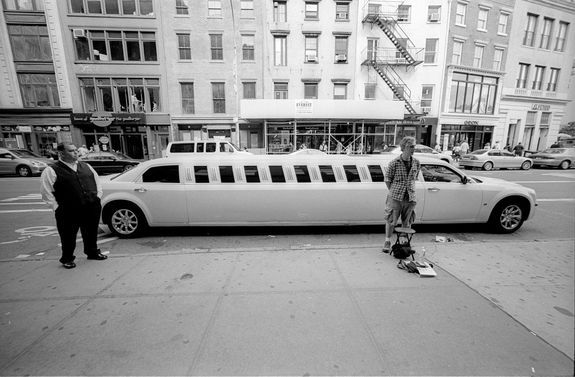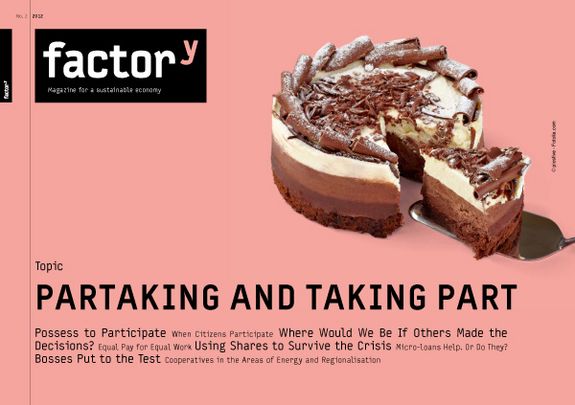Participation
Participation – Sharing for a Bigger Share

Despots are losing their power, pirates are taking over, citizens who feel politically marginalised are protesting, and everyone is taking part in the energy transition. Participation is a rediscovered measure for more democracy in the second millennium. Whether it be Occupy Wall Street or the occupation of other public spaces, open data or individuals with their own rooftop systems: more and more people in affluent societies worldwide feel excluded from decisions that have a major influence on their lives and their future.
The gap between those making decisions and those not benefiting from these decisions is widening. The end of participatory capitalism, the welfare of all through continuous growth, is becoming more and more obvious to most people in the industrialised countries. Even those in the developing countries who are left behind see no basis for their future in the currently utilized model.
Instead of going on as before without considering alternatives, people are starting to resist. The right to participate, to have a bigger piece of the cake, to be able to determine the size and flavour of this piece of cake as well is what people are calling for. And they are beginning to increase the pressure on governments through public disobedience or initiatives. It is because history has been shaped by people striving for participation that conditions for participation are possible in the first place. And yet, these conditions fall short of securing the livelihood of everyone within the scope of the necessary sustainable development.
However, encouraging ecological, economic and social participation is actually the key to more equality between and across generations. After all, this was the approach at the United Nations Conference on Environment and Development (UNCED) in Rio de Janeiro in 1992. What has become of this approach is visible today. We, the publishers, authors, editors, and graphic designers hope that this magazine succeeds in outlining how we all can achieve more by participating.
Ralf Bindel, Editor. Translated from the German by Sophia Benkewitz and Stefan Helwig.
More articles to the range of subjects participation, partaking and involvement can be found not only online but also in our magazine Partaking & Taking Part. Nicely illustrated and readable on tablet computers and monitors the PDF magazine contains all posts and photos as well as additional figures and quotes.
News zum Thema
- 01/2014 | Partaking and Taking Part
- 10/2013 | Crowdfunding for Sustainability-Maker
- 08/2013 | A Map for sustainable shopping in NRW
- 01/2013 | Exclusion makes people sick
- 01/2013 | Unmotivated, uninspired, uninvolved
- 03/2012 | The RV of the Future
- 03/2012 | Sustainia: A Sustainable Virtual World Is Born
Themen
- The Domino Effect: the Mobility Transition as an Engine for the ‘Great Transformation’
- Cities Use the Space
- Decarbonization by 2030
- The fear of biting the hand that feeds you
- Where investing is a pleasure
- Why divestment is going to change the world
- A Robin Hood tax for climate protection
- May the Force Be with Us
- Modern Strategies
- The prerogative of interpreting the future now lies with the companies involved in climate protection”
- From Negotiating to Trading Equitably
- Can a donkey be tragic?
- Rethink rather than rebound: a sufficiency revolution must precede the efficiency revolution
- On Rebound, Prebound and Performance Gaps
- So Let Us Seize Power Then!
- With Common Property Against Political Failure
- So Let Us Seize Power Then!
- The Comforting Beauty of Failure
- “It Is Not Impossible at All.“
- Resource-light shopping
- Men Have Not Stopped Giving the Advantage to Women – So Far
- Toothpaste for Princesses and Soup for Pirates
- It is about equality
- A nice day
- Initiative instead of frustration
- The right ingredients
- Resilient for Life
- Not only, but also
- Appreciation – more please!
- Worth more than money
- Learning to value the value of goods
- Worth and Values
- The Transformative Power of Science
- Historically effective: How innovation and technology transform
- The Disappearance of Products
- Growing Older 101
- Columbus’ Egg
- It Works! In Theory at Least ...
- What If...?
- Analysing Separately – Thinking and Acting Together!
- Let’s Break Away from Determined Breaking Points
- More Gold in Waste than in Mines
- The art of separation
- Should you really DIY?
- The Aesthetics of Do-It-Yourself
- Standing on One’s Own Feet
- From the handaxe to desktop fabrication
- Using Shares to Survive the Crisis
- When Citizens participate
- Possess to Participate
- The Right Growth at the Right Time
- Gunter Pauli and Blue Economy
- When Sustainability Grows
- How we treat Growth
- Illusions about Growth







